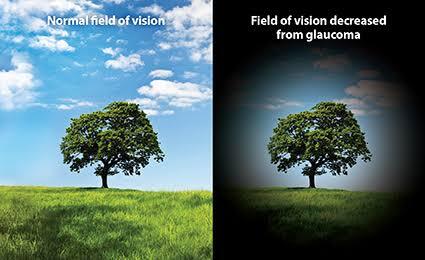ARE YOU AT RISK OF DEVELOPING GLAUCOMA?
Glaucoma is a chronic, progressive eye disease caused by damage to the optic nerve, which leads to visual field loss. Main cause of this disease is increase in IOP or eye pressure. An abnormality in the eye's drainage system can cause fluid to build up, leading to excessive pressure that causes damage to the optic nerve.
There are many risk factors which increase the risk of develpoping Gllaucoma.
Most important is family history of Glaucoma. If any of your first degree relative have glaucoma, you are at risk of developing Glaucoma.
Other Major risk factors are Age over 40. Black, Asian or Hispanic heritage.
Certain medical conditions, such as diabetes, migraines, high blood pressure, and sickle cell anemia. If you are suffering from Asthma, Autoimmune disease, and Arthritis and are under treatment with steroids, the risk of Glaucoma increases.
You are Glaucoma suspect, if you have undergone any eye surgery or had ocular trauma, or have been putting steroid eye drops for the long term for diseases like uveitis, allergy

Diabetes increases the chances of having glaucoma, People with diabetes are twice as likely to develop glaucoma as are non-diabetics
High Caffeine level is associated with glaucoma. Some studies suggest caffeine, Saturated Fats, and Trans Fats increase intraocular pressure.
Some Exercises also that can raise the risk of glaucoma
- Situps and pullups.
- Sprinting while running, biking, or swimming.
- Weightlifting, particularly powerlifting and bench presses
- Scuba Diving. ...
- Bungee Jumping. ...
- Yoga.
Deficiency of some vitamins are suspected to increase the risk of Nerve damage in Glaucoma. However, this is controversial as it has not been proven conclusively in studies.
- Five studies reported on the association of blood levels of vitamin D and glaucoma. In one study patients with glaucoma were reported to have lower serum 25-hydroxyvitamin D levels. Vitamin B12 (Methylcobalamin) has the most support for its role in glaucoma treatment. Multiple studies have looked into its effect on both chronic open-angle glaucoma as well as normal tension glaucoma. The limited evidence suggests that its use may slow visual field loss.
- Antioxidants and nitrates may reduce glaucoma risk and are found in fruits and vegetables. It is best to eat plenty of fruits and vegetables, especially those that are rich in vitamins A and C, carotenes, and nitrates. These include green leafy vegetables, carrots, cruciate vegetables, berries, citrus fruits, and peaches.
- One study showed that patients with glaucoma taking a supplement that included magnesium—along with homotaurine, carnosine, forskolin, folic acid, and vitamins B1, B2, and B6—demonstrated a statistically significant reduction in IOP, as well as improved light and contrast sensitivity.
If you are having any of the above risk factors, book your appointment for Glaucoma screening as soon as possible. Because Prevention is better than cure, but in Glaucoma You can neither prevent nor you can cure.